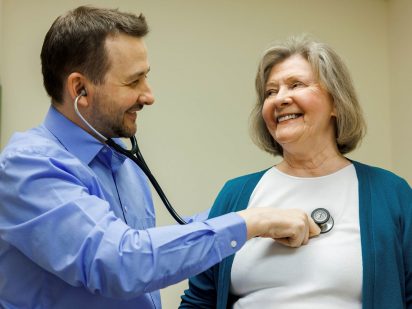Health screenings and routine checkups are the foundations of a healthy lifestyle. Yet many people have fallen out of the habit of checking in with their providers on a regular basis.
The coronavirus pandemic impacted lives in numerous ways – one was to discourage Americans from seeing their doctor and to stay current with health testing, particularly cancer screenings.
“COVID turned the world on its head,” said Aaron Makens, MD, family medicine physician with Trinity Health. “A lot of practices closed for a while. Many people were afraid to go to their doctor.”
The Journal of the American Medical Association reports an estimated 41% of US adults skipped medical care early in the pandemic, and many have been slow to return to those helpful routines.
“Especially when we’re younger,” Dr. Makens observes, “we’re healthy, and see ourselves as bulletproof. Then we get into our mid 30s and we start to see things happen. Many of us don’t go to a doctor until we have an issue.”
Health screenings and preventive health are important aspects of primary care. Even if you feel healthy, screenings are an essential tool for detecting health issues before they become more serious.
“Early detection is your best prevention,” Dr. Makens said. “It helps us identify problems before they get harder to control. When a patient comes in for a visit, whatever their chief complaint is – that takes priority. But preventive care is something I try to work in at every visit, whether it’s cancer screenings or vaccinations.”
As a family care specialist, Dr. Makens sees patients at every age. “I think about kids with their milestones; are they current with their immunizations? Then we get to middle age and we start to emphasize lipid panels, glucose, and hypertension. Are they up to date with their tetanus shot? We try to be proactive.”
Starting routine checks early in life matters. “The little adjustments and changes you make early on can make a big difference,” Dr. Makens said. “If you’re on a sailing ship and you change your navigation just a couple of degrees and then go for a thousand miles, you end up in a totally different location.”
Dr. Makens has his own health screening checklist that he uses with patients based on their history, age, gender and other factors. He doesn’t discourage patients from seeking information online, especially from reputable sites like the American Heart Association, American Cancer Association and “academy” sites that cater to a certain medical specialty.
“There are a lot of good tools,” he says. “The one thing I do tell patients is that when you see a lot of ads, that could be a red flag because maybe that site is funded by some interest that has a say in what you’re seeing on that website.”
By far, the best way to stay on top of good health is to establish a relationship with a provider.
“Primary care doctors are so important,” Dr. Makens said. “Our goal to improve quality of life; we’re not here to pressure people or get them to eat some bland diet that tastes like Styrofoam. But we can help manage conditions and establish realistic goals that improve your life. Part of it is just having a human listen to you.”

